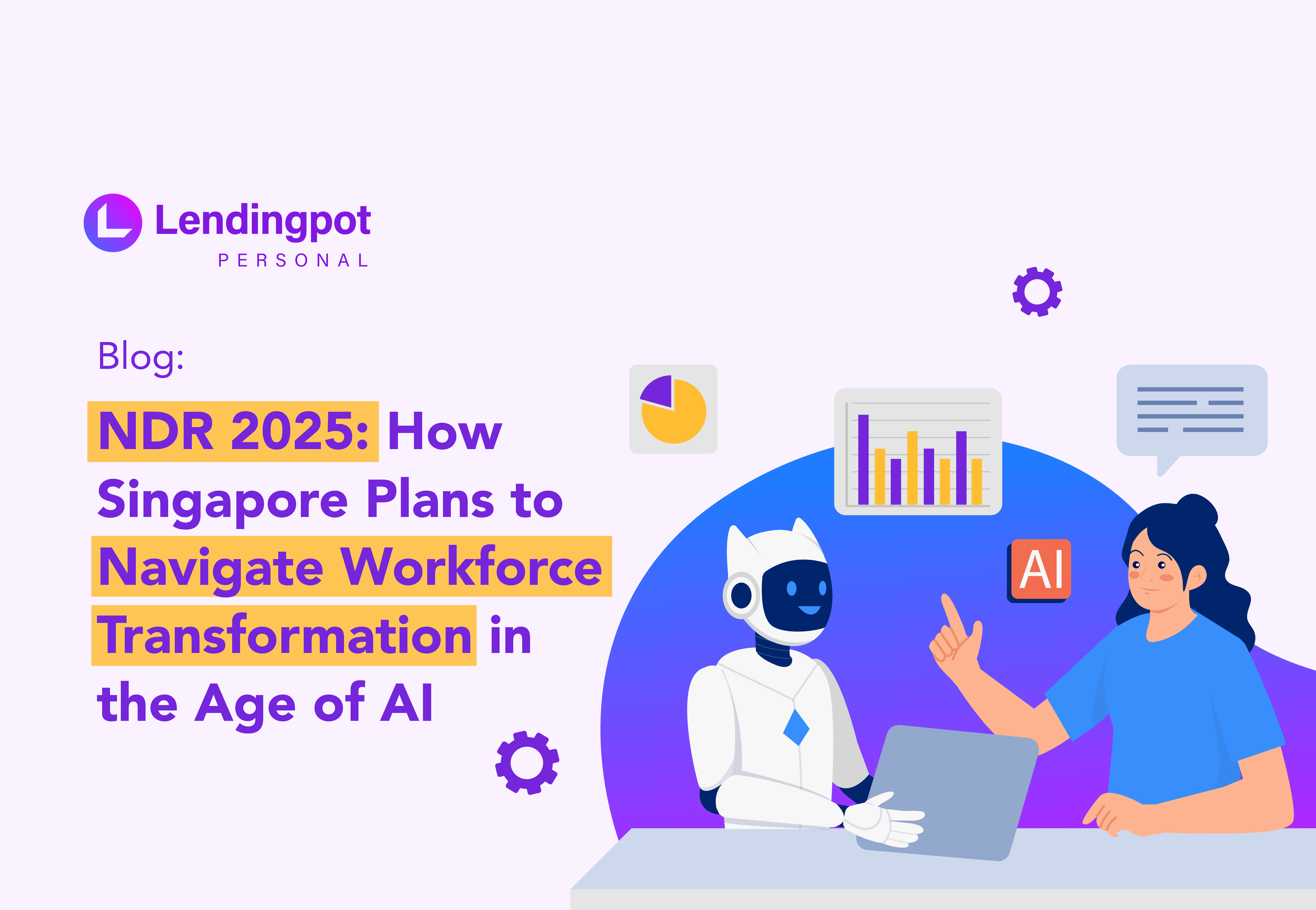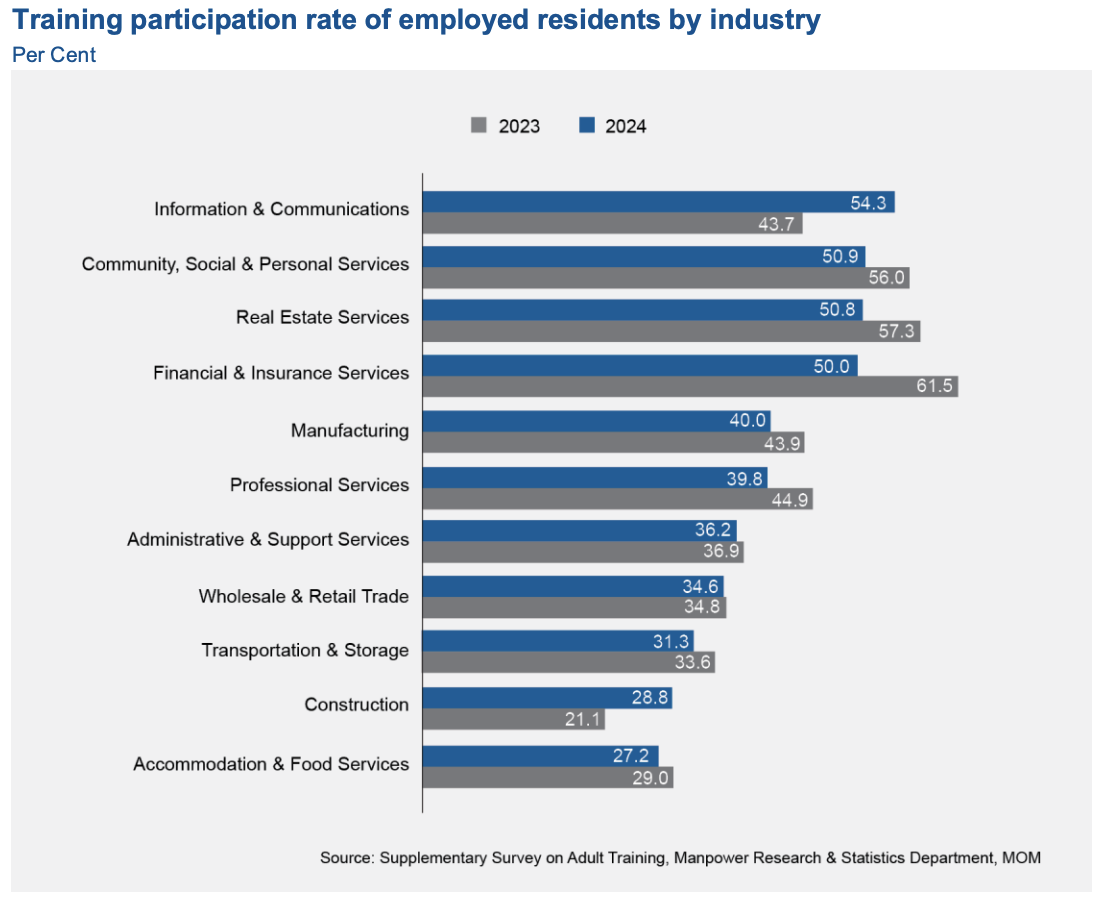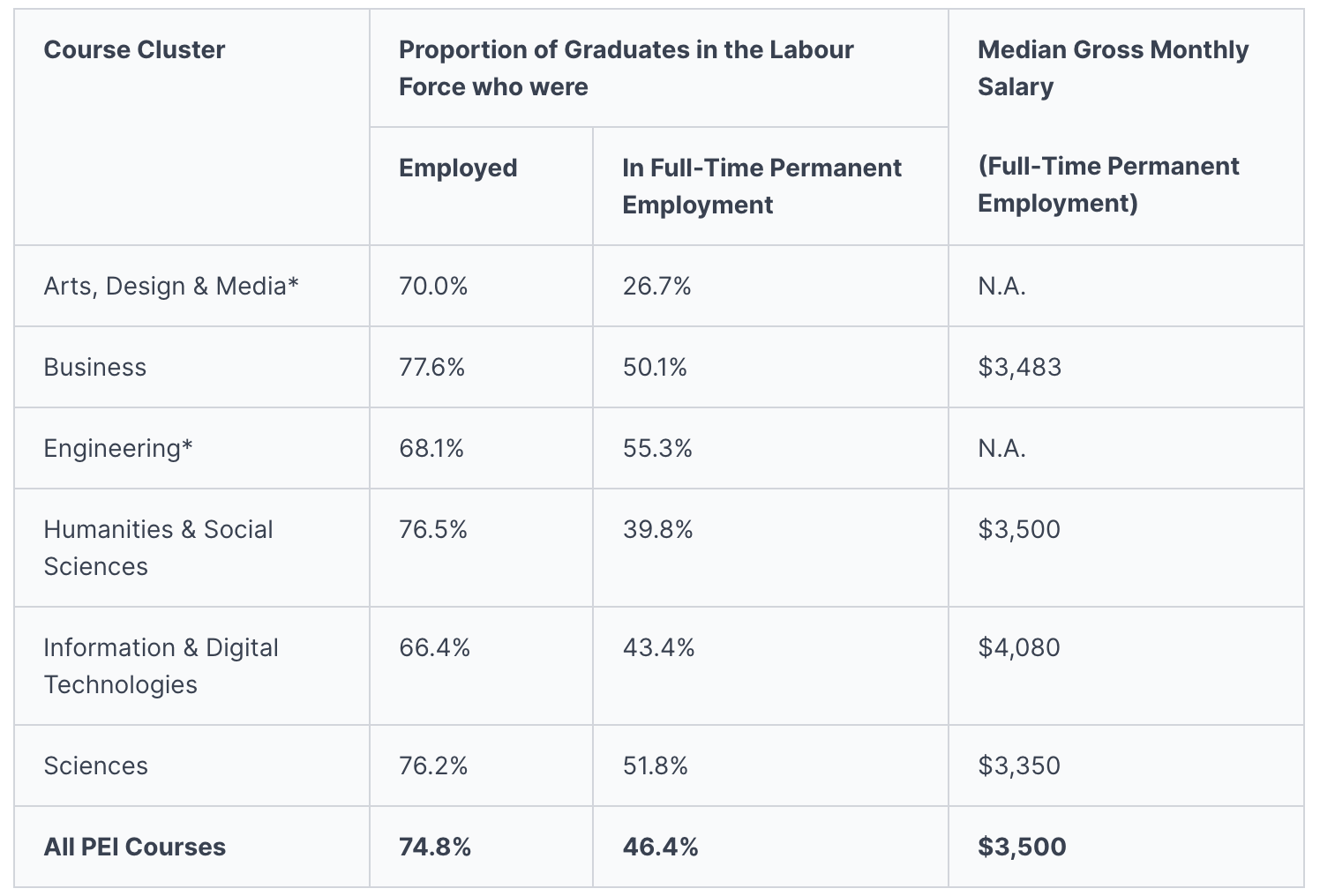
We break down Singapore's NDR 2025 plans to support mid-career workers, fresh graduates, and communities as part of broader efforts to prepare for economic change in the AI era.
Among several long-term priorities outlined during the National Day Rally (NDR) 2025, Prime Minister Lawrence Wong highlighted the rising influence of artificial intelligence and automation on Singapore’s economy and workforce.
According to data, 77 per cent of Singapore’s workforce is exposed to AI and most employers aim to be AI-driven by 2028. But the pathway is tough. Many people have significant concern with the new technology, older workers are at greater risk of job loss, and nearly a third of youth graduates require extra training to be work-ready.
Recognising these gaps, the government is strengthening support across three key areas: AI adoption in workforce, mid-career reskilling, and youth employability.
This explainer takes a closer look at how these workforce-related measures fit into Singapore’s broader strategy to remain competitive, inclusive, and future-ready.
AI is expected to reshape how businesses operate across sectors such as logistics, finance, and public services. However, many Singaporeans, especially those who are prone to be replaced with AI, face significant fear in adopting these technologies. According to a 2023 report, 67% of Singaporeans are concerned that AI will replace their jobs in the next couple years.
At NDR 2025, Prime Minister Lawrence Wong acknowledged concerns about AI replacing jobs, reassuring Singaporeans that the government is committed to supporting workers through this transformation. While AI will reshape industries, the goal is not to replace workers but to help them perform tasks more efficiently and create new, better opportunities. By coordinating with unions and businesses, the government ensures that AI adoption empowers people and doesn’t leave anyone behind.
Related Article: Learn about Singapore Budget 2025’s Cash, Grants, and Support for SMEs
The strategy for AI adoption focuses on responsible implementation, using technology to redesign jobs, increase productivity, and enhance worker capabilities. Instead of rushing into full automation, the government is taking a careful approach that prioritizes worker well-being, ensuring that everyone has a role in this transformation.
In short, Singapore’s strategy emphasizes a people-first transformation. By carefully introducing AI, the government aims to enhance human work, create new roles, and foster a more productive economy. This clear commitment ensures that AI adoption leads to inclusive growth, where everyone has the opportunity to benefit from this technological shift.
This approach mirrors how Singapore adapted to technological changes in the past. In the 1980s, the government launched a nationwide computerisation drive. Many Singaporeans, who didn’t have computers at home, were introduced to them in schools and community centers, like the Computer Club at Marine Parade Community Centre.
It wasn’t just young people. Workers were trained to use personal computers, which became common in offices everywhere. This transformed how people worked and opened up new opportunities. Then, in the 1990s, when the internet arrived, Singapore quickly adapted, upgrading skills to move forward.
While AI and automation will create new opportunities, they also bring about shifts in the skills demanded by the workforce, placing particular challenges on mid-career workers who may not be familiar with these new technologies.
According to 2024 data, the median age of Singapore's population has risen to 42.8 years, making it one of the oldest populations in Asia. And as Singapore’s workforce ages, there is a growing need for effective policies that help older and mid-career workers stay employable in a rapidly changing job market.
Additionally, for many mid-career workers, particularly those balancing family or financial obligations, reskilling and training remain a daunting task due to many factors, like time constraints. There needs to be a comprehensive approach that combines accessible training programs, flexible learning options, and strong support systems.
In fact, the employee training participation rate in 2024 has decreased compared to previous year, highlighting a growing concern about workforce readiness and the need for ongoing skills development.

In response to the challenges of an aging workforce and the need for continuous learning, the NDR 2025 introduced important updates to the Level-Up Programme. The programme has successfully helped thousands of workers gain skills in emerging sectors, leading to higher employment rates and career advancement in industries such as technology and healthcare. To make it even more accessible, two key changes were announced.
First, workers can now use part of the training allowance for part-time courses, not just full-time ones. This is especially helpful for older workers or those with family or work commitments who cannot study full-time but still want to improve their skills.
Second, the government will expand the range of courses available. While most courses were previously offered by Institutes of Higher Learning (IHLs), more courses will now be provided by industry leaders and private training providers. This ensures that the training is more practical and closely linked to current job needs, especially in growing areas like technology, healthcare, and green industries.
As the job market continues to evolve, policies like the Level-Up Programme that prioritize flexibility and practical learning will be essential in ensuring that mid-career workers remain an integral part of Singapore's growing economy. With ongoing support and innovation in reskilling, older workers will be empowered to navigate new opportunities.
While supporting mid-career and older workers is essential, it is equally important to ensure that young people are equipped with the skills and experience needed to enter the workforce confidently. Despite Singapore’s robust education system, many young people face significant hurdles when transitioning from school to work.
Based on a 2024 survey, 79.5% of Autonomous University fresh graduates secured full-time permanent roles within six months of graduation. While this figure may appear strong, it represents a noticeable decline from earlier years and still leaves one in five graduates without job stability. This signals growing challenges in the school-to-work transition, particularly in aligning academic preparation with evolving industry demands.
In contrast, private university graduates in Singapore are clearly struggling to find secure jobs. Data from the 2023/2024 survey shows that only 46.4% of Private Education Institution (PEI) fresh graduates managed to secure full-time permanent employment within six months of graduation.

This means that over half of private uni graduates remain unemployed or in insecure work months after graduation. Several factors may explain this disparity, including weaker industry recognition of private degrees, limited access to internships, and a mismatch between what is taught and what employers need.
Related Article: How to Qualify for a Student Loan in Singapore - A Complete Guide
To address these challenges, the NDR 2025 introduced a government-funded traineeship programme for ITE, polytechnic, and university graduates. Supported by the Singapore Economic Resilience Taskforce, this scheme offers paid, real-world exposure and will initially be rolled out in a focused manner, with the capacity to expand should economic conditions deteriorate.
Strengthening traineeships and career support benefits both businesses and young people. Businesses gain access to fresh talent ready to meet changing industry demands. For youth, these programmes provide valuable real-world experience and a smoother transition from education to meaningful employment, helping them build a strong foundation for their careers.
In parallel, the Government plans to expand job-matching services and career fairs, bringing employers directly into tertiary institutions and launching town-level recruitment initiatives via Community Development Councils (CDCs) to improve accessibility to entry-level opportunities.
These efforts go beyond short-term job placements. They are part of building a stronger talent pipeline that links education more closely to the needs of future industries. By helping students move smoothly from school to work, Singapore can better prepare young people for changing job demands and keep the economy strong.
As AI changes the way businesses compete and people work, it brings both challenges and new opportunities. Businesses that use AI well can grow and improve, while workers need to learn new skills and take on different roles.
Singapore’s workforce plans are made to support these changes by helping businesses stay strong and helping people build careers that can last into the future. At the same time, training and reskilling mid-career workers make sure Singapore has the skilled workers needed for the changing economy. For workers, reskilling means more job security and new chances to grow their careers even with fast-changing technology.
Finally, improving traineeships and building a strong talent pipeline link education with real jobs. This helps young people move more easily from school to work and gives businesses new workers who are ready for today’s industries. As part of the bigger plan shared at the NDR 2025, Singapore’s focus on building a strong workforce shows it is ready to face the challenges and use the opportunities that come with new technology.
The coming years will be important to make sure these plans work well for everyone.